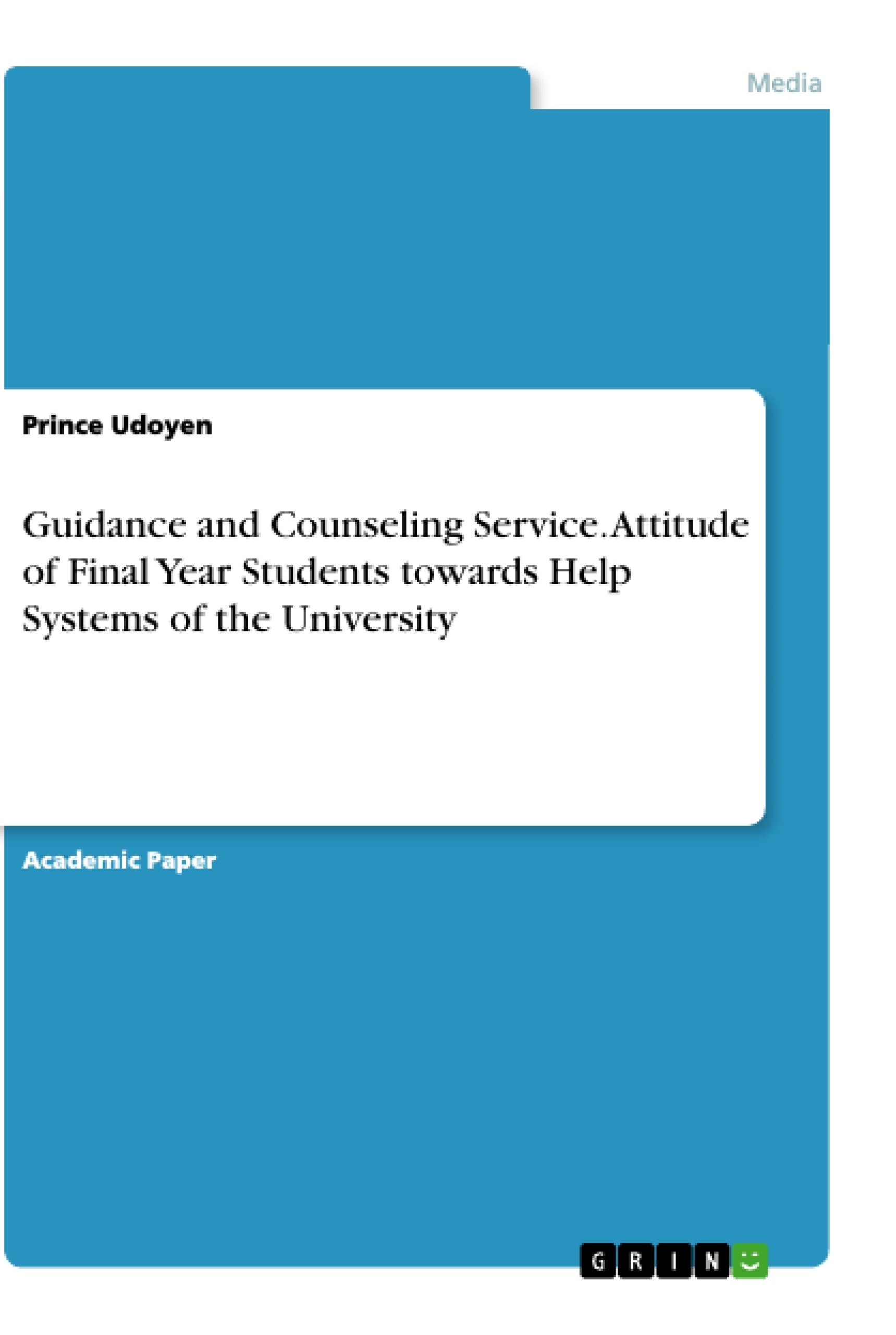This study was conducted to examine the attitudes of education final students towards guidance and counseling. This study will benefit policy makers, as they will develop, change and improve strategies for effective counseling and advisory services in higher education. The study adopted the descriptive research method and the research questions were adequately answered with a simple percentage. A total of 200 students from the faculty of Education, University of Uyo were enrolled in this study.
Young people are constantly plagued by personal, academic, or family influences. Sometimes these influences are positive, while other times the influences are negative. The consequences of negative influences are the strange decisions that young people make to avoid a growth process without problems for them. Counseling and counseling services in universities should help young people overcome these challenges, mainly in an academic environment, regardless of how they look. However, access to counseling and guidance services in the university is one of the services young people do not often use for logical and illogical reasons.
Inhaltsverzeichnis (Table of Contents)
- CHAPTER ONE: INTRODUCTION.
- 1.1 Background to the Study
- 1.2 Statement of the Problem
- 1.3 Purpose of the Study
- 1.4 Significance of the Study
- 1.5 Research Questions
- 1.6 Null Hypotheses
- 1.7 Scope of the Study
- CHAPTER TWO: LITERATURE REVIEW
- 2.1 Introduction
- 2.2 Concepts And Definitions
- 2.3 Aims Of Guidance And Counseling Programs
- 2.4 Guidance And Counselling Services
- 2.5 The Role Of Guidance And Counselling In Schools
- 2.6 Effective Teaching And Learning, Guidance And Counselling Perspective
- 2.7 Contribution Of Counselling Towards The Sustainability Of Education System
- 2.8 Possible Issues And Problems Of Guidance And Counselling In Schools
- 2.9 Theoretical Framework
- CHAPTER THREE: RESEARCH METHODOLOGY
- 3.1 Design of study
- 3.2 Area of study
- 3.3 Population of the study
- 3.4 Sample and sampling technique
- 3.5 Instrumentation
- 3.6 Reliability
- 3.7 Validity
- 3.8 Method of Data Collection
- 3.9 Method of Data Analysis
- CHAPTER FOUR: DATA PRESENTATION AND ANALYSIS
- 4.1 Analysis of Research questions
- 4.2 Test of Null hypotheses
- 4.3 Discussion of Findings
- CHAPTER FIVE: SUMMARYAND CONCLUSION
- 5.1 Summary of study
- 5.2 Conclusion
Zielsetzung und Themenschwerpunkte (Objectives and Key Themes)
This study aims to examine the attitudes of final-year education students towards guidance and counseling services at the University of Uyo. The study seeks to understand the factors influencing these attitudes and to provide recommendations for improving the effectiveness of counseling services within the university's educational environment.- The importance of guidance and counseling services in supporting student well-being and academic success.
- Factors influencing students' attitudes towards guidance and counseling services, including accessibility, effectiveness, and perceived relevance.
- The impact of gender on students' attitudes towards guidance and counseling services.
- The role of counseling services in promoting positive academic and personal development.
- Recommendations for improving the effectiveness and accessibility of guidance and counseling services for education students.
Zusammenfassung der Kapitel (Chapter Summaries)
- Chapter One: Introduction This chapter introduces the research topic, outlines the problem, and clarifies the study's purpose, significance, and scope. It also presents the research questions and null hypotheses that will guide the investigation.
- Chapter Two: Literature Review This chapter explores relevant concepts and definitions related to guidance and counseling. It examines the aims of guidance and counseling programs, the role of counseling services in schools, and the theoretical frameworks underpinning the study. It also explores the potential issues and challenges associated with guidance and counseling in educational settings.
- Chapter Three: Research Methodology This chapter details the research design, including the study area, population, sampling technique, instrumentation, reliability, validity, data collection methods, and data analysis techniques. It provides a comprehensive overview of the methodological framework employed for the study.
- Chapter Four: Data Presentation and Analysis This chapter presents the findings of the study through data analysis and interpretation. It explores the answers to the research questions, the results of the hypothesis tests, and the key insights emerging from the data.
Schlüsselwörter (Keywords)
This study focuses on the attitudes of final-year education students towards guidance and counseling services in a university context. Key terms include: guidance and counseling, student attitudes, higher education, counseling services, gender, accessibility, effectiveness, and university environment. The study examines the influence of gender on students' attitudes and explores the potential impact of counseling services on student well-being and academic success.- Citation du texte
- Prince Udoyen (Auteur), 2020, Guidance and Counseling Service. Attitude of Final Year Students towards Help Systems of the University, Munich, GRIN Verlag, https://www.grin.com/document/1034909



